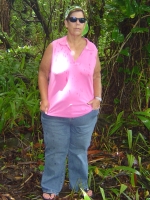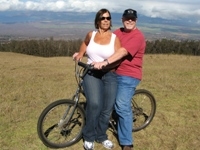I often speak at the introductory seminars offered by my surgeon. I do it because I want to pay it forward and share “The Impossible Dream” with those who are thinking it may exist in their future. I get a surge of adrenaline every time I start my presentation with, “Hi, my name is Sandi and in 2004 I sat in your seat weighing 424 pounds…” It is both saying it out loud and the shocked response from across the room that causes my adrenaline rush.  The rest of my story is not written, rehearsed, or planned. It is what feels right that day for the group I am speaking with. I am thrilled to be a “beacon of hope” to many who have come to find out about weight loss surgery, and speaking my successes out loud helps keep me moving in a positive direction. So everybody wins and that’s great.
The rest of my story is not written, rehearsed, or planned. It is what feels right that day for the group I am speaking with. I am thrilled to be a “beacon of hope” to many who have come to find out about weight loss surgery, and speaking my successes out loud helps keep me moving in a positive direction. So everybody wins and that’s great.
I have been extremely reflective lately as I approach my eighth “surgiversary”, never having maintained a normal weight for this long before in all of my 63 ½ years. What did it take to get me here, and what am I doing to stay in this wonderful place called a normal weight? Some of the answers came to me as I was swimming laps for 50 minutes this morning at 6:30. This is what I did to lose 250 pounds:
- For the first year I followed The Lessons Of Successful Lap band Patients. I was religious about it, as were most of the other “results not typical” WLS successes that I have met. This meant I was

- Eating good, quality meals and not grazing
- Getting enough protein every day
- Not drinking with meals
- Not drinking my calories
- Taking small bites chewing thoroughly and putting the fork down between each bite
- Avoiding the foods that were difficult for me to eat like bread, rice, and some fibrous fruits and vegetables. I was learning about my food choices and learning how to dine and enjoy food.
- Always planning for how to use my tool, no excuses
- Keeping a food, feelings, and eventually, an exercise journal daily
- Seeing my surgeon monthly and attending support groups regularly and calling successful patients with questions as they came up for me
- Making myself a priority
Following these lessons for the time it took me to lose the 250 pounds was key to my success. I needed to know what my “job” was in using my tool, and I needed to reinforce myself constantly.
Anyone who has weight loss surgery of any type who follows these lessons can lose weight. How do you keep it off once you get there? No, this is not a trick question. The answer is the same - follow the lessons, adapting them to your life and defining and refining them as you go along. Many people choose to have a surgery, get the weight off, and then totally disassociate from the weight loss surgery community. It works for some of them. Others are the ones who have 50% and more regain. I choose to remain connected to this community to both provide and receive support, clear in the knowledge that I do it for myself as much as I do it for others. 
Here are some examples of “adapting” The Lessons:
- I now know that I need a protein drink in the morning so I make one and have half on the way to the gym at 6 am and the other half after the gym. This gives me the energy for a better work out, and the requisite protein after the workout for optimum results. It also puts some more fresh fruit into my diet. This means I have 4 meals per day and need to account for them carefully so I did not just add 200 calories to my day without making accommodations.
- While I do not frequently “drink” my calories as either coffee drinks or alcohol I do have an ice blended, no sugar added mocha latte from C B & T L once a week, and a glass of wine on Saturday night. I found that I can make accommodations in my eating plan for this. I do have to pay attention to make sure that neither becomes a daily ritual because the calories start adding up quickly.
- Currently I only journal when I need to get back to basics because I have not been paying attention. I have the kind of brain that can track what I am eating throughout the day and be 90+ % accurate on a calorie and protein count at the end of the day. I can do this BECAUSE I spent a year journaling daily and know many of the calorie/protein counts of the foods I put in my mouth. So I only use a written journal once in a rare while.
- While I currently only see the surgeon about once a year, I still attend support groups monthly and have a group of friends who have also had surgery and we can support each other’s successes
So are these Lessons all it takes to be successful after weight loss surgery? I think we all realize the answer to this question is a resounding NO. These are just the lessons that make up the persistence part of the equation. If we persist in following these lessons we will lose weight. However, it wasn’t just the simple acts of putting food into my mouth and chewing and swallowing, that created the obesity I lived with for 55 years. I am still working on recovering from obesity and will probably be doing so for the rest of my life…….and, by the way, that is perfectly okay. As I peeled away the layers of fat I learned things about myself daily and I continue learning. I learned that food was comfort for me. It was a reward for successes as well as a means of dulling the pain of failures, real or perceived. I could hide behind it, stuffing how I felt with each bite and not have to “deal” with whatever the issue of the moment was. I could make food the center of my life and revolve around it, instead of living life and eating to live instead of living to eat. I could turn over control of my life to food and not take the reins in my hand, make my choices, and live with the results I chose. Both my mind and my body were so “sick” with what I was feeding on that I could deny that food had this control over me, even as I sat in my car while my husband went grocery shopping because I physically could not walk around in the market any longer. I was college educated, owned a successful business, was married to a wonderful man, yet still lived in this world as addicted to sweets and carbohydrates as any heroin addict is to their drug.

Every day I peel back the onion a little more, feeling my feelings, making choices both good and bad about food as well as every other aspect of my life. You see, now I have a life. Am I going to go bike riding on this beautiful afternoon, or work in the garden, or play on the beach with my grandkids, or eat a bag of potato chips? The good choices are obvious, but my obesity is “in remission”, I am in the process of recovering, and this is a lifelong process, so the choices, all of them, are there every day for me to make. I am grateful I have my tool, my lap band, because it helps me with some of the choices, and I am not alone.
 The rest of my story is not written, rehearsed, or planned. It is what feels right that day for the group I am speaking with. I am thrilled to be a “beacon of hope” to many who have come to find out about weight loss surgery, and speaking my successes out loud helps keep me moving in a positive direction. So everybody wins and that’s great.
The rest of my story is not written, rehearsed, or planned. It is what feels right that day for the group I am speaking with. I am thrilled to be a “beacon of hope” to many who have come to find out about weight loss surgery, and speaking my successes out loud helps keep me moving in a positive direction. So everybody wins and that’s great.

